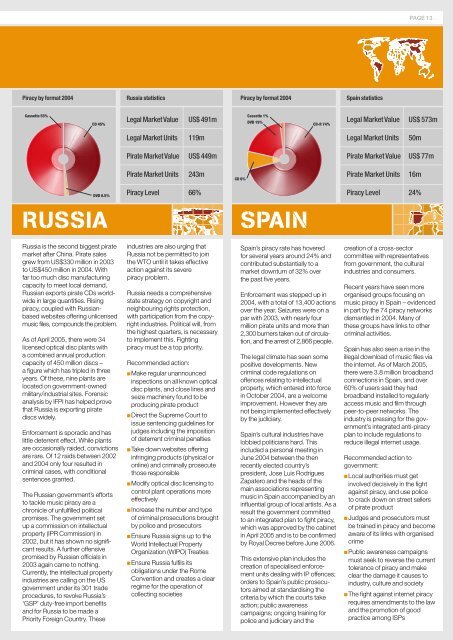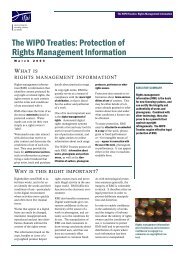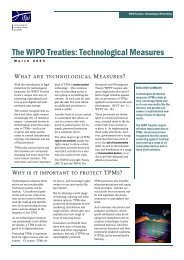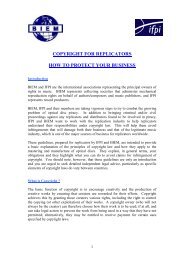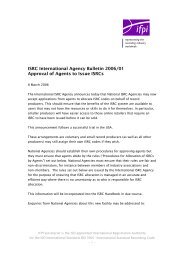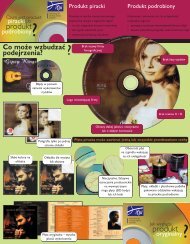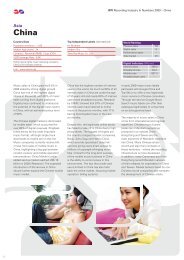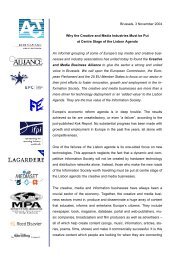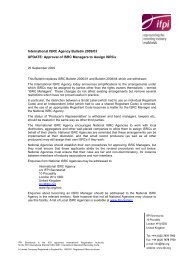*IFIC 20ppv3 - IFPI
*IFIC 20ppv3 - IFPI
*IFIC 20ppv3 - IFPI
Create successful ePaper yourself
Turn your PDF publications into a flip-book with our unique Google optimized e-Paper software.
PAGE 13<br />
Piracy by format 2004<br />
Russia statistics<br />
Piracy by format 2004<br />
Spain statistics<br />
Cassette 55%<br />
CD 45%<br />
Legal Market Value<br />
US$ 491m<br />
Cassette 1%<br />
DVD 19%<br />
CD-R 74%<br />
Legal Market Value<br />
US$ 573m<br />
Legal Market Units<br />
119m<br />
Legal Market Units<br />
50m<br />
Pirate Market Value<br />
US$ 449m<br />
Pirate Market Value<br />
US$ 77m<br />
Pirate Market Units<br />
243m<br />
CD 6%<br />
Pirate Market Units<br />
16m<br />
DVD 0.5%<br />
Piracy Level 66%<br />
Piracy Level 24%<br />
RUSSIA<br />
SPAIN<br />
Russia is the second biggest pirate<br />
market after China. Pirate sales<br />
grew from US$330 million in 2003<br />
to US$450 million in 2004. With<br />
far too much disc manufacturing<br />
capacity to meet local demand,<br />
Russian exports pirate CDs worldwide<br />
in large quantities. Rising<br />
piracy, coupled with Russianbased<br />
websites offering unlicensed<br />
music files, compounds the problem.<br />
As of April 2005, there were 34<br />
licensed optical disc plants with<br />
a combined annual production<br />
capacity of 450 million discs –<br />
a figure which has tripled in three<br />
years. Of these, nine plants are<br />
located on government-owned<br />
military/industrial sites. Forensic<br />
analysis by <strong>IFPI</strong> has helped prove<br />
that Russia is exporting pirate<br />
discs widely.<br />
Enforcement is sporadic and has<br />
little deterrent effect. While plants<br />
are occasionally raided, convictions<br />
are rare. Of 12 raids between 2002<br />
and 2004 only four resulted in<br />
criminal cases, with conditional<br />
sentences granted.<br />
The Russian government’s efforts<br />
to tackle music piracy are a<br />
chronicle of unfulfilled political<br />
promises. The government set<br />
up a commission on intellectual<br />
property (IPR Commission) in<br />
2002, but it has shown no significant<br />
results. A further offensive<br />
promised by Russian officials in<br />
2003 again came to nothing.<br />
Currently, the intellectual property<br />
industries are calling on the US<br />
government under its 301 trade<br />
procedures, to revoke Russia’s<br />
‘GSP’ duty-free import benefits<br />
and for Russia to be made a<br />
Priority Foreign Country. These<br />
industries are also urging that<br />
Russia not be permitted to join<br />
the WTO until it takes effective<br />
action against its severe<br />
piracy problem.<br />
Russia needs a comprehensive<br />
state strategy on copyright and<br />
neighbouring rights protection,<br />
with participation from the copyright<br />
industries. Political will, from<br />
the highest quarters, is necessary<br />
to implement this. Fighting<br />
piracy must be a top priority.<br />
Recommended action:<br />
■ Make regular unannounced<br />
inspections on all known optical<br />
disc plants, and close lines and<br />
seize machinery found to be<br />
producing pirate product<br />
■ Direct the Supreme Court to<br />
issue sentencing guidelines for<br />
judges including the imposition<br />
of deterrent criminal penalties<br />
■ Take down websites offering<br />
infringing products (physical or<br />
online) and criminally prosecute<br />
those responsible<br />
■ Modify optical disc licensing to<br />
control plant operations more<br />
effectively<br />
■ Increase the number and type<br />
of criminal prosecutions brought<br />
by police and prosecutors<br />
■ Ensure Russia signs up to the<br />
World Intellectual Property<br />
Organization (WIPO) Treaties<br />
■ Ensure Russia fulfils its<br />
obligations under the Rome<br />
Convention and creates a clear<br />
regime for the operation of<br />
collecting societies<br />
Spain’s piracy rate has hovered<br />
for several years around 24% and<br />
contributed substantially to a<br />
market downturn of 32% over<br />
the past five years.<br />
Enforcement was stepped up in<br />
2004, with a total of 13,400 actions<br />
over the year. Seizures were on a<br />
par with 2003, with nearly four<br />
million pirate units and more than<br />
2,300 burners taken out of circulation,<br />
and the arrest of 2,866 people.<br />
The legal climate has seen some<br />
positive developments. New<br />
criminal code regulations on<br />
offences relating to intellectual<br />
property, which entered into force<br />
in October 2004, are a welcome<br />
improvement. However they are<br />
not being implemented effectively<br />
by the judiciary.<br />
Spain’s cultural industries have<br />
lobbied politicians hard. This<br />
included a personal meeting in<br />
June 2004 between the then<br />
recently elected country’s<br />
president, Jose Luis Rodrigues<br />
Zapatero and the heads of the<br />
main associations representing<br />
music in Spain accompanied by an<br />
influential group of local artists. As a<br />
result the government committed<br />
to an integrated plan to fight piracy,<br />
which was approved by the cabinet<br />
in April 2005 and is to be confirmed<br />
by Royal Decree before June 2006.<br />
This extensive plan includes the<br />
creation of specialised enforcement<br />
units dealing with IP offences;<br />
orders to Spain’s public prosecutors<br />
aimed at standardising the<br />
criteria by which the courts take<br />
action; public awareness<br />
campaigns; ongoing training for<br />
police and judiciary and the<br />
creation of a cross-sector<br />
committee with representatives<br />
from government, the cultural<br />
industries and consumers.<br />
Recent years have seen more<br />
organised groups focusing on<br />
music piracy in Spain – evidenced<br />
in part by the 74 piracy networks<br />
dismantled in 2004. Many of<br />
these groups have links to other<br />
criminal activities.<br />
Spain has also seen a rise in the<br />
illegal download of music files via<br />
the internet. As of March 2005,<br />
there were 3.8 million broadband<br />
connections in Spain, and over<br />
60% of users said they had<br />
broadband installed to regularly<br />
access music and film through<br />
peer-to-peer networks. The<br />
industry is pressing for the government’s<br />
integrated anti-piracy<br />
plan to include regulations to<br />
reduce illegal internet usage.<br />
Recommended action to<br />
government:<br />
■ Local authorities must get<br />
involved decisively in the fight<br />
against piracy, and use police<br />
to crack down on street sellers<br />
of pirate product<br />
■ Judges and prosecutors must<br />
be trained in piracy and become<br />
aware of its links with organised<br />
crime<br />
■ Public awareness campaigns<br />
must seek to reverse the current<br />
tolerance of piracy and make<br />
clear the damage it causes to<br />
industry, culture and society<br />
■ The fight against internet piracy<br />
requires amendments to the law<br />
and the promotion of good<br />
practice among ISPs


